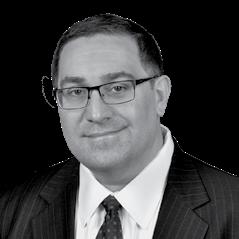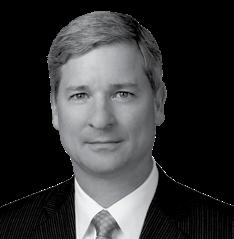
13 minute read
Seeing From Both Sides of the Table
When clients of Akin’s global white collar and regulatory practice ask what the other side is thinking, former federal prosecutors Michael Asaro and Charles Connolly know the answer.
CCBJ: Please share your backgrounds and information about your respective practices.
Advertisement
Michael Asaro: I started my career at the SEC’s Division of Enforcement. Then I went to the DOJ, first in the Southern and then Eastern District in New York, as a prosecutor primarily focused on white collar matters. I came to Akin Gump about 13 years ago. My practice tends to be SEC, CFTC [Commodity Futures Trading Commission], and DOJ focused. I work closely with our investment funds clients, doing investigation defense and internal investigations, responding to subpoenas, bringing in witnesses for government interviews and testimony, and doing a fair amount of compliance consulting, even when there is no subpoena, to keep our clients from getting sideways with the SEC or other regulators. We have over a dozen partner-level, former government lawyers in different capacities, from the SEC to the DOJ, to the FCA [Financial Conduct Authority] in the UK. Our main clients are banks and hedge funds, and we do a lot of public company board representations, and individual representations of corporate executives as well.
Charles Connolly: Like Mike, I spent almost 11 years at the DOJ, first I spent five years as a prosecutor in the Eastern District of Virginia in the white collar, financial crimes, and public corruption unit. I then worked as a counselor and acting deputy chief of staff for U.S. Attorney General Michael Mukasey before returning to the Eastern District, where I ultimately served as Chief of the financial crimes and public corruption unit. In that role I supervised approximately a dozen AUSAs investigating and prosecuting complex financial crimes. I joined Akin Gump in 2013. In my role here, I represent both individuals and companies in criminal and regulatory matters, and conduct internal investigations. My focus is on complex financial frauds and corruption matters. We regularly coordinate and partner on investigations with our international trade group, which has a big focus on sanctions enforcement. In D.C., our group includes a strong Congressional investigations practice, which is composed of former DOJ and Congressional investigators.
How does your experience in public service inform your practice and how you work with government officials?
Connolly: It is critical to being a successful white collar partner in this space. Having spent a decade putting together complex financial crimes, from investigation, to charging, and ultimately for presentation to the jury, I understand the thinking of a prosecutor. Clients often want to know: “What is the other side thinking?” My experience allows me to say, “Here’s how I would have analyzed this. Here are the steps they are taking. Here are the steps they will likely take next.” Understanding the process and what the prosecutor may be thinking, allows you to communicate that to your client and helps you evaluate strategy.
It also helps when you’re dealing with government officials. They know that you appreciate what they’re doing and what they’re looking at, and it helps you communicate to them and identify issues that you know they’re thinking about, even if they haven’t articulated it. This allows you to address high-level concerns early on and raise issues you think the prosecutors may be sensitive to. Our prior government experience helps us build credibility with prosecutors, so when we’re making representations, officials take that seriously. That has served us well in a number of investigations over the past few years.
Asaro: Having been in that seat gives you a unique insight as to what is persuasive when you are advocating to the
government. Part of what we can do for clients is try to avoid them being charged, or at least come up with a resolution that minimizes the impact if the government does insist on going forward with charges, one that allows the client to move on with their life and business. For me personally, some of the best victories are when we saved individuals from criminal or significant civil charges. Once you’re on trial, even if you win, you lose to some degree. People don’t get their lives, careers, and reputations back in the same way.
There’s an art to dealing with the government before you’re in a courtroom, and it’s a very tricky form of advocacy, since you are sitting across the table trying to persuade your adversary, who often has dug-in views. To be effective, it is extremely helpful to have been on the other side of the table, sat through many of those presentations, and been in the room with the team afterward and talked about what was persuasive and what wasn’t. You’re not going to get special favors from former colleagues, nor would we ever ask, but credibility is key. As a group, we’re focused on strongly advocating for our clients but also making sure we maintain the reputation and credibility of our practice with regulators, because that’s to the benefit of all our clients going forward.
What has changed about fraud and financial crimes over the past 20 years?
Asaro: In the past 20 years, there have been a steady stream of major financial scandals, which have really changed the regulatory framework dramatically. In the late 1990s, when I started out at the SEC, the big cases of the day involved mobbed up boiler rooms, which were almost “street crime” white collar cases. Then, as we got into the 2000s, we saw a sea change with the accounting scandals of Enron and WorldCom, the dot-com bubble burst, and later the housing crisis. Each of these pushed the pendulum of more aggressive
SEC, DOJ, CFTC, and foreign regulatory enforcement. In the past 10 years, as we were coming out of the financial crisis of the late 2000s, there’s been an ever increasingly aggressive practice of government enforcement, and the fines have gotten bigger. I remember seeing a $1 billion fine for the first time – that was a watershed moment – and now fines of hundreds of millions of dollars are par for the course.
There’s also a global nature to investigations, and dealing with multiple agencies across borders has become much more prevalent than ever before.
Connolly: As Mike said, we are seeing more situations where U.S.-based agencies are coordinating with law enforcement throughout the world, so that allows for information sharing and coordination with respect to the cases that are brought. The U.S. may take the lead in going after a company in some situations and allow law enforcement in other countries to focus on the foreign individuals involved. In other situations, the coordination allows U.S. law enforcement to more quickly and efficiently bring cases that, 10 – 15 years ago, may have been much tougher to bring.
The other change is the use of data analytics. The SEC has long leveraged data analytics to bring insider trading cases. Similarly, for years, the DOJ health care strike forces have relied on data analytics to quickly identify potential targets on which to focus investigative resources. More recently, data analytics have been a driving force in the DOJ and CFTC’s spoofing enforcement focus. I expect the DOJ to increase its use of hard data as a way to more quickly distinguish what behavior is an outlier and therefore potentially criminal.
Has there been an increase in white collar prosecutions?
Connolly: My sense is that there has been some general slowdown over the past few years. Part of that is attributable to the conclusion of some of the large and complex invesFor a lot of GCs, there’s too much to know and too much to do. You have to have people you can trust and rely on to help figure out what you need to address. – MICHAEL ASARO
tigations in the wake of the financial crisis. Those cases take a long time to ramp up. As they conclude, there’s a sense that the DOJ and other agencies catch their breath a bit.
It may also be due to the disruption of COVID-19. My experience has been that investigations that were in the early stages, where agencies were issuing subpoenas and gathering documents, continued pretty aggressively, as did investigations in the latter stages of settlement negotiations. But the fact-finding development of witness interviews slowed or were put off. Now, we are seeing agencies learn how to do those things remotely, and that’s ramping back up again.
In a typical life cycle of white collar enforcement, you tend to see an increase in enforcement after periods of economic distress, so I do think an increase in white collar matters will come out of the current economic distress the country is facing.
Asaro: Warren Buffet said at one point, “It’s only when the tide goes out that you discover who’s been swimming naked.” In terms of the COVID-19 crisis, the tide has gone out and the government is going to be looking to see who has their shorts on and who doesn’t. That’s what’s happened historically, and it’s going to happen again. We’re already starting to see investigative activity and new investigations get opened.
What are the priorities of law enforcement agencies?
Connolly: The FCPA and anti-corruption remain a priority. Financial crimes, including money laundering and accounting fraud, are always going to be a priority for a variety of reasons, including that many different agencies can investigate and bring financial fraud cases, including the CFTC, the SEC, various DOJ components and U.S. attorney offices throughout the country, along with state regulators, such as the New York Department of Financial Services. Finally, we are seeing an increase in economic sanctions enforcement, an area in which we have a very deep bench.
Asaro: A reconfiguring of the priorities with the administration change, coming up on four years ago, resulted in a little bit of a pause for the agencies. We’re still seeing a lot of investigation, but it’s not the same fever pitch as the Obama administration, when, particularly with the SEC, it felt like almost everything was going to be an enforcement case. Lately, that agency has been more thoughtful in picking and choosing the cases it actually brings.
Two years ago a big chunk of our pie was SEC securities-type investigations, many of them with DOJ components. CFTC enforcement has always been a big piece as well and, in the past year, commodities-based investigations jointly between the CFTC and the DOJ. Also, Congressional involvement has been extremely active, and for our big institutional clients, many of those investigations are typically joint Congressional investigations with other enforcement agencies, like the DOJ, CFTC, or SEC.
In terms of specific priorities, COVID-related scams are a focus at this moment – anybody leveraging off the crisis and fears related to the crisis to try to defraud people. Insider trading is continuing to be a focus. Market manipulation has kept us busy in the last year or two, particularly in the CFTC space. For cryptocurrency investigations, anything cyber related, we’ve got a group who are experts on responding to cyberintrusions and cyberthreats. We’ve been involved in some significant investigations in those areas as well.
What’s your advice to a general counsel who is new to a publicly traded company?
Connolly: You have to be comfortable with your team and that you have the support of senior management. It’s a difficult job, and in many ways, especially at a public company, it’s not a job that one can do alone. Focus on the team around you, including those who report up to you, whether in the compliance function or within the general counsel’s own structure. For a lot of GCs, there’s too much to know and too much to do. You have to have people you can trust and rely upon to help figure out what you need to address.
Asaro: Know your business. It is how you identify what your weak points are from a compliance perspective. When you start, even if you feel like there is already a good set

of controls place, do a top to bottom walk through of the compliance program to understand the biggest risks. Some questions I’d ask are: How are we addressing them from a compliance perspective? Do we have sufficient resources? Do we have the right team in terms of size and expertise? How are compliance and management working together to instill a strong compliance culture with the right “tone from the top”?
You’ve got to have a deep understanding of what your organization does and have good lines of communication and integration between legal and compliance and the business. Everything flows from there. Without that, you’re not going to be able to foster a good corporate culture from a compliance perspective.
Connolly: As a GC for a public company, it is critical to have confidence in your compliance function. Compliance can serve as the canary in the coal mine and highlight problems early on. They can help you prevent issues from becoming even bigger.
Particularly if you’re going into a public company in an area that is not a subject matter where you have expertise, don’t be afraid to ask the outgoing GC, outside counsel, or people who have been there a long time “What was keeping you up at night?” “Where are the risk factors?” “Where are the weaknesses within the organization?”
Asaro: And be tuned in to the current trends. What are the regulators focusing on, and to what extent do you have regulator interaction with the regulators based on the type of organization you are? Even if you have a good sense of the risk today, what are the risks going to be tomorrow? Get in front of them. Know your key regulators and make sure you’ve got good relations with them, especially if you’re dealing with on a regular basis.
Lastly, have good partnerships with outside counsel, rather than just calling in different outside counsel when a subpoena shows up. There are many things you need outside counsel for in your business, so try to consolidate and have relationships where outside counsel knows your organization and can advise you on what these forward-looking trends and risks are. We, as a firm, are in tune with trends because we’ve got many, many clients in many industries. We’re constantly getting practical feedback from many sectors about what they’re facing.
Connolly: Outside counsel who you have a good relationship with can send someone over to help educate you and your team on a topic or how we handle a concern. We do a lot of front-end compliance of that nature.
Akin also has a general counsel boot camp for general counsels who haven’t had that experience before. It’s a program designed to help them not necessarily answer every question but at least know what questions to ask and where to look.

Michael Asaro is a partner with Akin Gump. He represents companies and individuals in high-stakes, white collar regulatory investigations and litigation. Asaro served for five years as a federal prosecutor and four years as an enforcement attorney at the Securities and Exchange Commission (SEC). Reach him at masaro@akingump.com.

Charles Connolly is a partner with Akin Gump. He represents companies and individuals in government and corporate investigations. Connolly also defends against allegations of violations of federal and state regulations related to financial crimes. Reach him at cconnolly@akingump.com.








